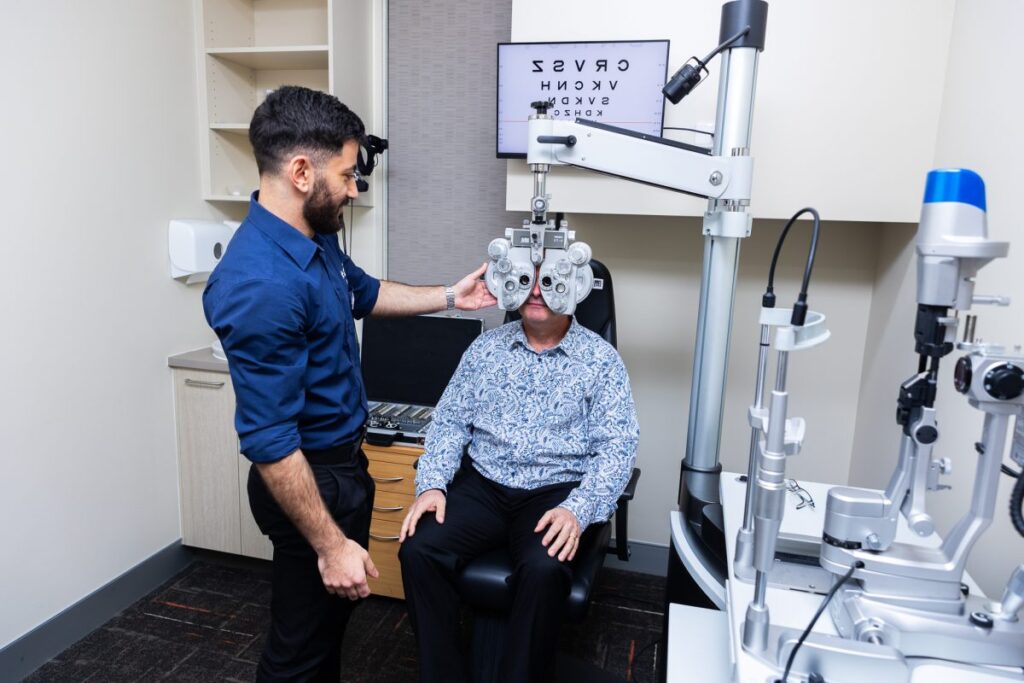Cataract surgery is a common procedure that can significantly improve vision for those suffering from cataracts. If you’re considering this surgery, it’s essential to have a comprehensive understanding of the process, risks, and benefits. This article aims to guide you through the top questions to ask your doctor about cataract surgery in Canberra, ensuring you are well-informed before making any decisions.
Understanding Cataracts
Before delving into the specifics of cataract surgery, it is crucial to understand what cataracts are and how they affect vision. A cataract occurs when the natural lens of the eye becomes cloudy, leading to blurred vision and difficulty in seeing clearly. This condition is often age-related but can also result from other factors such as diabetes, prolonged use of corticosteroids, or eye injuries. The gradual development of cataracts can often go unnoticed at first, as the changes in vision may be subtle and easily attributed to the natural ageing process or fatigue.
For those considering cataract surgery Canberra, it is essential to find a qualified and experienced ophthalmologist who can guide you through this process. Taking the time to ask questions and understand your options will empower you to make the best decisions for your eye health.
Interestingly, cataracts can also be influenced by lifestyle choices. For instance, excessive exposure to ultraviolet (UV) light from the sun can increase the risk of developing cataracts. This highlights the importance of wearing sunglasses that block UV rays, not only for comfort but also for long-term eye health. Additionally, a diet rich in antioxidants, such as vitamins C and E, may help to delay the onset of cataracts, suggesting that nutrition plays a significant role in eye health.

What are the Symptoms of Cataracts?
Common symptoms of cataracts include cloudy or blurry vision, difficulty seeing at night, sensitivity to light, and seeing halos around lights. Patients may also experience frequent changes in prescription glasses or contact lenses. Recognising these symptoms early can lead to timely intervention and improved quality of life. In some cases, individuals may also notice a fading of colours or a general dullness in their visual perception, which can be disconcerting and may affect one’s enjoyment of daily activities.
Moreover, the impact of cataracts extends beyond mere visual impairment; it can also affect emotional well-being. Many individuals may experience feelings of frustration or isolation as their ability to engage in social activities diminishes. This underscores the importance of seeking help and discussing any changes in vision with a healthcare professional, as addressing cataracts can significantly enhance not only visual clarity but also overall quality of life.
Learn more at: Everything You Should Know About Cataracts Treatment Before Deciding
When Should I Consider Surgery?
While cataracts are a natural part of the ageing process, surgery is typically recommended when they begin to interfere with daily activities. It’s essential to discuss your lifestyle and how your vision affects it with your doctor. If you find yourself struggling with tasks such as reading, driving, or watching television, it may be time to consider surgical options. The decision to undergo surgery is often a collaborative process between the patient and the ophthalmologist, taking into account the severity of the cataracts and the individual’s personal circumstances.
It is worth noting that cataract surgery is one of the most commonly performed procedures worldwide, with a high success rate. The surgery involves removing the cloudy lens and replacing it with an artificial intraocular lens (IOL), which can significantly improve vision. Patients can often return to their normal activities within a short period after the procedure, making it a viable option for those looking to regain their independence and enhance their quality of life. Understanding the benefits and risks associated with cataract surgery is crucial, and patients should feel empowered to ask questions and express any concerns they may have during their consultations.
Questions About the Surgical Procedure
Understanding the surgical procedure itself is vital for alleviating any concerns and ensuring you are comfortable with the process. Here are some key questions to ask your doctor regarding the surgery.
What Does the Surgery Involve?
Cataract surgery is usually performed as an outpatient procedure, meaning you can go home the same day. The surgery typically involves removing the cloudy lens and replacing it with an artificial intraocular lens (IOL). Your doctor will explain the specific techniques used, such as phacoemulsification, which uses ultrasound waves to break up the cataract before removal.

How Long Will the Surgery Take?
The actual surgery usually lasts about 15 to 30 minutes, depending on the complexity of the case. However, you should plan for additional time for pre-operative preparations and post-operative recovery. Understanding the timeframe can help alleviate anxiety and allow for better planning on the day of the procedure. Learn more about anxiety at https://www.nimh.nih.gov/health/topics/anxiety-disorders
What Type of Anaesthesia Will Be Used?
Cataract surgery is generally performed under local anaesthesia, which numbs the eye area while you remain awake. Some patients may also receive mild sedation to help them relax. Discussing your concerns about anaesthesia with your doctor can help ensure you feel comfortable and informed about the process.
Post-Operative Care and Recovery
Recovery after cataract surgery is a crucial aspect of the process, and understanding what to expect can help ensure a smooth transition back to daily activities. Here are some important questions to consider.
What Should I Expect After Surgery?
Post-operative experiences can vary, but most patients notice an improvement in vision within a few days. It’s normal to experience some discomfort, such as mild itching or a gritty sensation in the eye. Your doctor will provide specific instructions on how to care for your eye and what symptoms to watch for during recovery.
When Can I Resume Normal Activities?
Most patients can return to light activities within a day or two following surgery, but it’s essential to avoid strenuous activities, heavy lifting, or swimming for at least a week. Your doctor will provide tailored advice based on your individual recovery progress. Following these guidelines is crucial for ensuring optimal healing.
What Signs of Complications Should I Be Aware Of?
While cataract surgery is generally safe, complications can occur. It is vital to be aware of signs such as sudden vision changes, increased pain, or redness in the eye. If you experience any of these symptoms, contact your doctor immediately. Understanding potential complications can help you feel more prepared and reassured throughout the recovery process. To find more about complications click here.
Choosing the Right Intraocular Lens (IOL)
One of the critical decisions during cataract surgery is selecting the appropriate intraocular lens. There are various types available, each with its own benefits and considerations. Here are some questions to discuss with your doctor.
What Types of IOLs Are Available?
There are several types of IOLs, including monofocal, multifocal, and toric lenses. Monofocal lenses provide clear vision at one distance, while multifocal lenses can help with near and distance vision. Toric lenses are designed for patients with astigmatism. Your doctor can help you understand which option may be best suited to your lifestyle and vision needs.
How Will the Lens Choice Affect My Vision?
Your choice of IOL can significantly impact your post-surgery vision. Discussing your daily activities and visual needs with your doctor will help determine the most suitable lens. Understanding the implications of each lens type can assist you in making an informed decision that aligns with your lifestyle.
Are There Additional Costs for Premium Lenses?
Some premium IOLs may come with additional costs not covered by Medicare or private health insurance. It’s essential to clarify any financial implications with your doctor and your health insurance provider. Being aware of potential costs can help you budget effectively and avoid unexpected expenses.
Long-Term Outcomes and Expectations
Understanding the long-term outcomes of cataract surgery is essential for setting realistic expectations. Here are some questions to consider discussing with your doctor.
What Are the Expected Outcomes of the Surgery?
Most patients experience a significant improvement in vision following cataract surgery. However, individual results may vary based on factors such as age, overall eye health, and the presence of other eye conditions. Your doctor can provide insights into what you can realistically expect based on your specific circumstances.
Will I Need Glasses After Surgery?
Many patients find that they no longer need glasses for distance vision after surgery, especially if they choose a multifocal lens. However, some may still require reading glasses for close-up tasks. Discussing your vision goals with your doctor can help clarify what to expect in terms of reliance on corrective eyewear.
What Are the Risks of Cataract Surgery?
While cataract surgery is generally safe, it is essential to be aware of potential risks, including infection, bleeding, or retinal detachment. Your doctor will discuss these risks in detail, helping you weigh the benefits against the potential complications. Understanding the risks can empower you to make an informed decision regarding your surgery.
Preparing for Your Consultation
Preparing for your consultation can help ensure that you make the most of your appointment. Here are some tips on how to approach your visit.
What Information Should I Bring?
Bringing a list of your current medications, any previous eye surgeries, and a record of your eye health history can provide your doctor with valuable information. Additionally, consider writing down any symptoms you have experienced and questions you wish to ask. This preparation can lead to a more productive discussion.
How Can I Communicate My Concerns Effectively?
Being open and honest about your concerns is crucial for effective communication with your doctor. Don’t hesitate to express any anxieties you may have regarding the surgery or recovery process. A good doctor will appreciate your openness and will work to address your concerns thoroughly.
What Should I Expect During the Consultation?
During your consultation, your doctor will conduct a thorough eye examination and discuss your vision needs and lifestyle. They will also explain the surgical process, answer your questions, and help you understand the risks and benefits. Being prepared for this conversation can help you feel more at ease and informed.
Conclusion
Cataract surgery can be a life-changing procedure that restores vision and enhances quality of life. By asking the right questions and engaging in open dialogue with your doctor, you can ensure that you are well-informed and prepared for the journey ahead. Remember, your vision is invaluable, and taking the time to understand the surgical process is a crucial step towards regaining clarity and confidence in your sight.

